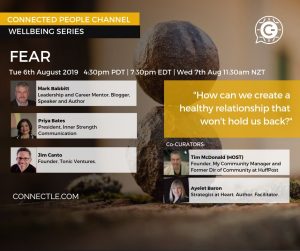I have had the pleasure of working with  Tim McDonald for some time now, and we have explored many ideas with regard to connections. Lately, Tim has begun writing about fear and is developing a book, “Creating a Healthy Relationship with Fear”.
Tim McDonald for some time now, and we have explored many ideas with regard to connections. Lately, Tim has begun writing about fear and is developing a book, “Creating a Healthy Relationship with Fear”.
Tim has taken an interesting approach to this by reaching out to his contacts, and asking for their input, in order to build a grand idea of what fear means to different people and how we each deal with or relate to our fears.
I had the pleasure to talk with Tim on this point and shared my experience of living in fear as a child growing up in the school system. I continued with this, to discuss how I broke the bonds that held me in place, when I was a young adult.

In addition to this opportunity to share, Tim co-hosted, with Ayelet Baron, a thought-provoking conversation on fear on a platform called Connectle. The focus of the talk was about how the participants had positively engaged with fear and how they support others to do so. It was interesting in the way that it clearly highlighted fear as a fabcrication of the mind and that it is something that the mind can engage with and relate to. A key take away was that fear can be a roadblock to progress or a boost to fire our actions. Click here to check out Connectle and view the conversation when it is shared, on the 9th of August.
One perspective that was not discussed by the panel was that of a child. All of the participants had the adult perspective locked and confidently shared what, as adults, we can do to come to terms with fears that are part of our lives, but children do not have some of the luxuries or tools at their disposal that adults do. I offered some ideas to think about, in the text chat, and was invited to appear on camera.
I asked about the following situations:
- the child who is forced to go to a place of fear 5 days a week for 7 hours a day;
- the child who lives in that fear and does not change or challenge it because of the possibility of it worsening should they speak out;
- the child who knows things will get worse if they challenge the current circumstance
- the child who does not have a voice because of physical or mental limitations, so the adults and peers do not know their thoughts and feelings.
These situations are harrowing, and adults have the responsibility to step in and support. This responsibility does not fall only to adults who work regularly with children but could be something as innocuous as a smile to a child as they get on the bus; a question of support when a child walks with head down and shoulders slumped, or another acknowledgement of some kind. Children have not had the range of experiences adults have and therefore have, generally, not been able to develop the skills and experiences adults have to relate to fear. So, help them to develop.
Be a positive influence to othetrs around you by being open to change; show that change need not be such a major source of fear. Be the person who listens to enable and encourage others, who are stuck, to find their path rather than being the one who has all the answers and will solve all the problems. Model relating to fear, model it in your day to day life and in your interactions with others, regardless of status or age.
I enjoyed talking with Tim and the others on the panel and look forward to opportunities to talk and share ideas, in the future.